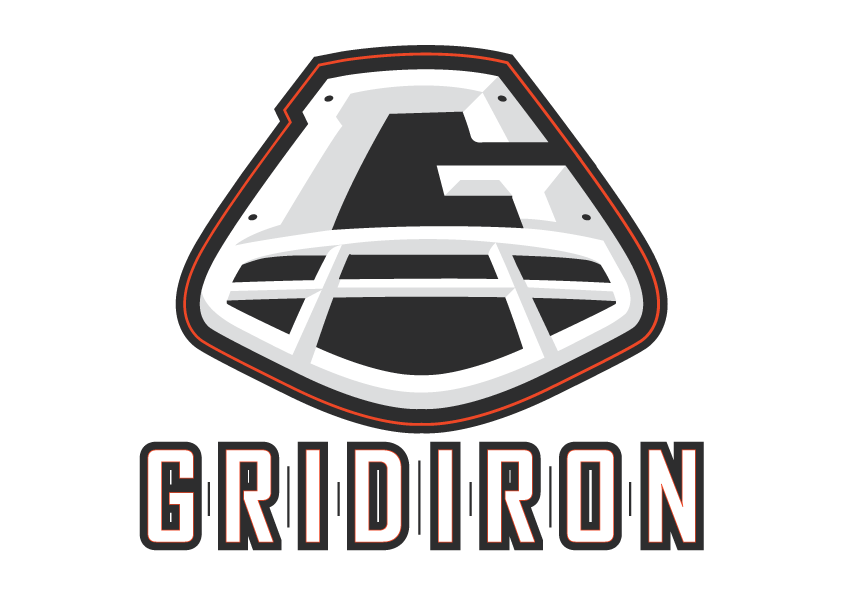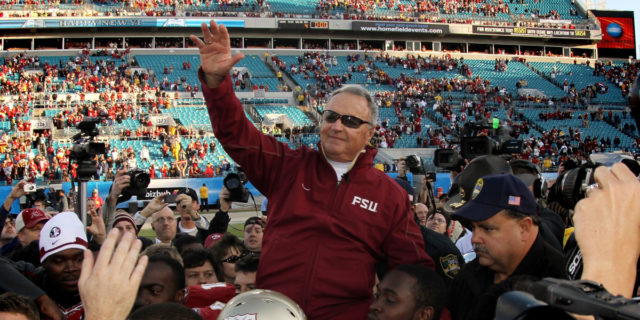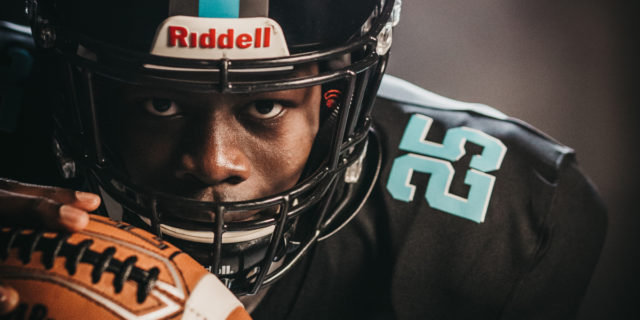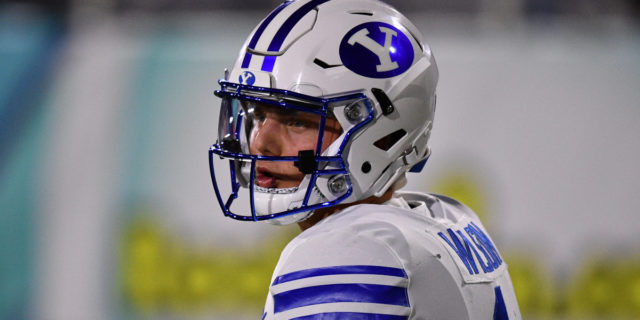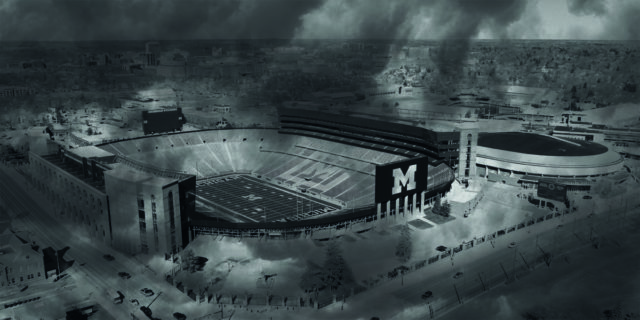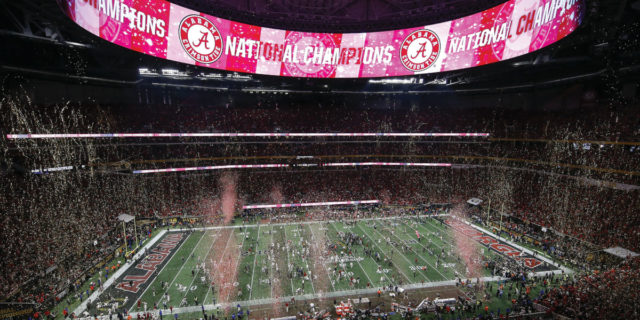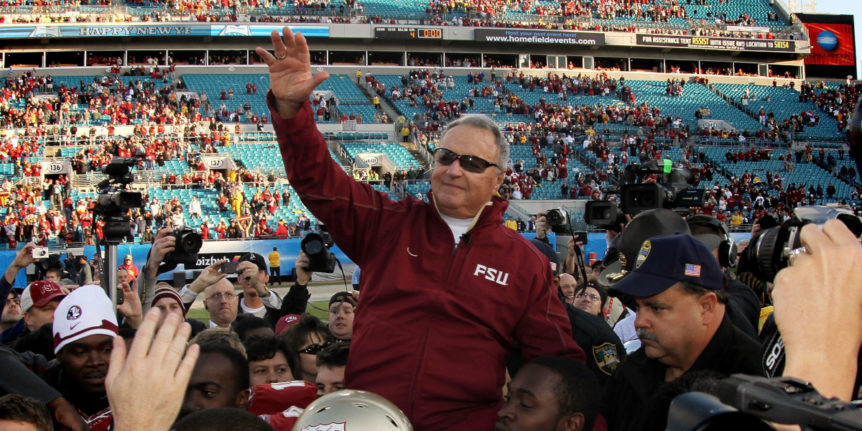
The Bowden Letters
This article originally appeared in Issue LXV of Gridiron magazine, back in 2021 – for individual editions or subscriptions, click HERE
The message from Sue Hall is a simple one. Written in thick black ink on light blue paper, carefully folded at the bottom, it reads: “Simon, I am Coach Bowden’s assistant. Will be touring England for 1st time in May ’95 – do you have any brochures on what is very special to see – Only there for 3 days – If you do and can send to me would be greatly appreciated – Sue”.
There is a smiley face drawn after her name and attached is her business card held to the thin paper with a single, now rusty staple. The accompanying letter is dated August 17, 1994. I was 20 and had just graduated from university, two months away from starting a job at the BBC and using up the last days of my final summer before starting full-time employment sending letters to my pen friend in Tallahassee.
You see, the note from Sue Hall wasn’t a surprise. I’d been writing to her boss, one of the greatest college football coaches of all time, for years. And faithfully, Bobby Bowden, winner of 377 games, including two National Championships, and head football coach at Florida State for 34 seasons, would always write back.
“When I came to FSU the bumper stickers read ‘Beat Anybody’.”
When Bobby Bowden died in the early hours of August 8 at the age of 91 surrounded by his wife and six children in the home he’d moved into when he was hired by FSU nearly half a century earlier, he left behind one of the great coaching legacies. He ranks second all-time for victories in major college football history behind Joe Paterno, and fourth all-time across all divisions. He may not have won as many National Titles as Nick Saban or Woody Hayes, but few coaches have had such an impact. He turned Florida State from a programme that had won only four games over the previous three seasons into a national powerhouse, out-recruiting everyone else by winning over parents with his folksy charm and easy nature, and developing their sons into All-Americans, major award winners and NFL superstars.
“When I was at Alabama the bumper stickers read ‘Beat Auburn’,” he recalled in ‘The Bowden Way’, his book on leadership. “When I was at West Virginia they read ‘Beat Pitt’. When I came to FSU the bumper stickers read ‘Beat Anybody’.”
That’s exactly what Bowden set about doing. His Seminoles were unbeaten in bowl games between 1982 and 1995. Between 1987 and 2000, he guided them to 14 consecutive 10-win seasons and top-five finishes in the AP Poll. And he did so in an era where college football was significantly more competitive than it is now. Penn State, Miami, Nebraska, BYU, Alabama, Colorado, Florida, Georgia Tech, Tennessee, Ohio State, Oklahoma, USC and Texas all won National Championships during the golden years of his tenure.
It was that level of parity that attracted me to the game in the mid-1980s. I’d become obsessed with the NFL Draft and how it worked and sought to delve further into how and why players became prospects. I’d spend hundreds of hours listening with my ear pressed to a silver double cassette deck as games were transmitted via the Armed Forces Radio Network, the lifeblood of my teenage years. For some people it was Emperor Rosko on Radio Luxembourg, or John Peel’s sessions with David Bowie or Joy Division. For me it was the relaxing tones of the staff sergeants linking between drives with news from around the globe, before handing back to the Westwood One commentary teams transporting me to South Bend, Madison, Ann Arbor, and Tallahassee.
I’d been drawn to the Seminoles by the same measures that those prospective parents had used to judge whether to hand their sons to an athletic programme for the best part of four years: Bowden’s personality. His dry sense of humour and charm in post-game interviews dripped through the wireless. I was fascinated by his country-boy ways, and his use of the word “dadgummit” to highlight a point whether good or bad. But I also loved the fact that his home phone number was listed in the local phone book, and that fans would leave memorabilia in his carport, and he’d sign it and then they’d swing back round and pick it up. So, it gave me an idea.
Between the ‘Sincerely’ and his name he’d signed it ‘Coach Bowden’, his signature light and loopy on the paper. Alongside the letter was a signed copy of the 1994 Orange Bowl press guide.
For a couple of years, I’d been writing to the sports information offices of major colleges requesting media guides. Most schools would send them through, and my little bedroom was full of these thick books full of facts and history that I’d pore over at night, listening to radio plays or news of troop deployments, or messages home from soldiers in far-flung lands on Armed Forces Radio and Television Service. Some schools would include pictures of players which I’d Blu Tack to my bedroom wall – Trevor Cobb of Rice, Gordie Lockbaum of Holy Cross and Tony Rice of Notre Dame. But when I discovered that fans could drop things off at Coach Bowden’s house, I figured he might just be fascinated enough by a letter from a 19-year-old English kid to respond. I’d been watching the Noles play each week thanks to a company in Germany called Pontel. For a yearly subscription, they’d send you a VHS copy of the previous week’s game from any college team of your choosing. So, every Friday, six days after they’d played, my VHS would arrive in the mail and, after my parents went to bed, I’d sit and watch FSU, making notes on potential draft picks, remembering plays I’d heard live on the radio.
By the late autumn of 1993, full of the knowledge of players like Charlie Ward and freshman sensation running back Warrick Dunn, I penned a letter to Bowden, thanking him for the season and wishing him good luck against Nebraska in the National Championship game. I thought it too informal to send it to his home, so instead mailed it to the FSU athletic department, wondering if it would reach its destination on the other side of the world.
I can’t quite remember what I wrote in that first letter, but days turned to weeks and there was no reply. The calendar flicked onto 1994, the Seminoles beat the Cornhuskers 18-16 to claim the National Championship, and my 20th birthday came and went with no response from Florida State.
Then on the morning of February 1, 1994, a large, yellow envelope arrived at the house with a big ‘FLORIDA STATE UNIVERSITY’ address label and a note to say that it had been sent from ‘Coach Bobby Bowden’. Underneath his printed name were the words “SCALP ‘EM, SEMINOLES”. The envelope was sellotaped and had a little gold-embossed fastener.
I carefully unstuck the tape and pinched the fastener to open the envelope. My heart beat just a little faster. Inside was a single piece of white paper, dated January 25, 1994, with the following message:
“Dear Simon,
Sorry about the delay in answering, but the mail has just been overwhelming – first because of Christmas and then the Orange Bowl. However, I enjoyed and do appreciate your kind note and want to thank you for it and your support; it means so much to us here at Florida State University. Especially when it comes from a fan as far away as England. That’s a long way from Tallahassee! Glad you get to enjoy the games and root for the Seminoles.
Again, thanks for your kind words. My best to you and take care of yourself during what I’m sure will be a happy and prosperous new year.
Sincerely,
Bobby Bowden.”
Between the ‘Sincerely’ and his name he’d signed it ‘Coach Bowden’, his signature light and loopy on the paper. Alongside the letter was a signed copy of the 1994 Orange Bowl press guide.
Over the course of the next five years, Bowden and I would exchange letters. They started as complimentary congratulations from a fan but quickly became long-distance Q&A sessions with me asking one of the greatest college coaches of all time a series of in-depth questions about his team, his life and his career. Each letter would be handwritten by me and sent off, then faithfully returned a few weeks later from Tallahassee with every question answered fully, page after long page, often with interesting and informative detail, each envelope containing pictures or memorabilia, business cards or bumper stickers.
“All losses hurt but I think the loss to Miami in 1991 hurt the most.”
As I sit here now and read through them almost three decades later, there’s so much about them that is fascinating and insightful:
On running back Dunn: “His one drawback is he’s not very big – only 5’9, 175 pounds. We know that we cannot just give him the ball over and over and over. He is just not big enough to take that pounding.”
On Wide Right I where the number-one ranked Seminoles missed a 34-yard field goal with 29 seconds left when trailing 17-16 to the number-two ranked Miami: “In my view it should have been a ‘gimmie’ kick. All losses hurt but I think the loss to Miami in 1991 hurt the most.”
On the ‘shoe scandal’ where several players were accused of taking part in an after-hours shopping spree at a sporting goods store: “I believe we got off to a slow start because of it. We never could get the continuity up on the offensive line that we wanted, and I think a lot of it is because we had so many of our offensive linemen suspended anywhere from two to three to four games.”
On a future superstar in 1995: “We signed four outstanding freshmen receivers we hope can help us next year. One of them, Peter Warrick, many think is the probably the second-best receiver in the country.”
And then in 1998: “I think Peter might have as much or more talent than any receiver we’ve had here, but he is going to have to be more consistent and disciplined.”
And finally in 1999: “Peter had a great year for us. I will say this about him, I think he’s the most dangerous receiver we’ve had at Florida State. The most dangerous kid I’ve ever coached.”
On Steve Spurrier: “Coach Spurrier speaks whatever he feels, not being concerned how it will sound in the paper or what effect it will have on anybody else. He probably needs to be a little bit more guarded in what he says because sometimes if you want to say something, it’s best not to say it anyway.”
On his son Terry resigning from Auburn in 1998: “I was really hurt. I’m not mad at Auburn, I’m mad at the people who drove him out.”
He also commented on Randy Moss’ rookie season in the NFL. Moss had signed with FSU in 1995 but sat out the season after transferring from Notre Dame, only to fail a drugs test whilst on probation, forcing Bowden to release him from his scholarship: “He continues to astonish me,” Bowden wrote. “When he came to FSU and I watched him practice, I felt like we really had a superstar, there was no way he could miss. All he had to do was behave himself.”
Bowden would sign off each letter by imploring me to “come see us if you’re ever over this way”. I clearly had invited him to do the same if he ever came to England because one letter finishes: “Thanks for the invitation to come visit with you. If I’m ever over that way I will. I would love to talk to you, and I hope you keep selling American Football to the British.”
“We need somebody who’ll suck it up and go get that passer, somebody to make that great catch. We need a hero.”
I stopped sending the letters in 1999. I figured that after five years he’d probably had enough of being interrogated. I often wonder if he ever missed the back and forth with this strange English pen friend he’d had across several seasons. In the aftermath of his death, I wondered why I’d never made it to Tallahassee clutching a bunch of the letters and asking if he remembered me.
I have no idea whether Bowden ever made it to England for those three days. I do remember that I sent Sue Hall an envelope with brochures on Bath, Stratford and London, focusing on the coach’s interest in history and World War II. What I do know with some certainty is that for five years he thrilled me with letters and packages that gave me a unique insight into what made Robert Cleckler Bowden such a special human being.
At half-time of the game that Bowden told me was the most disappointing of his career – the 17-16 loss to Miami – the number-one ranked Seminoles led number-two Miami 10-7. As his players got ready to go back out, he silenced them and gave them a final instruction. “You realise we’re just 30 minutes away,” he said. “We need somebody to make a great play. We need somebody who’ll suck it up and go get that passer, somebody to make that great catch. We need a hero, men. We need a hero.”
Bobby Bowden was my hero. Rest easy on your journey home, coach.
This article originally appeared in Issue LXV of Gridiron magazine, back in 2021 – for individual editions or subscriptions, click HERE
